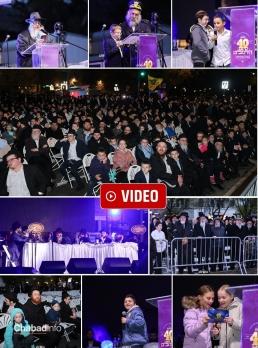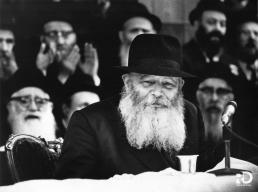“You Will Be The Rav!”
The Rebbe called in three Chassidim from Montreal for a surprise Yechidus, and told them about the needs of their developing community. Then, turning to one of them the Rebbe said: “You will be the rav!” • By Beis Moshiach Magazine • Full Article
Avrohom Reinitz, Beis Moshiach
5707/1947. The phone rang in the office of Rabbi Kramer, director of Chabad mosdos in Montreal. Rabbi Kramer tensed as he heard the secretary of the Rebbe Rayatz on the line. To his great surprise, the secretary told him that the Rebbe had called for three of Anash to travel to New York to have yechidus with him. The three Chassidim who received this summons were Rabbi Yitzchok Hendel, who was rosh yeshiva of Tomchei Tmimim in Montreal; Rabbi Aryeh Kramer who ran the Chabad mosdos; and Rabbi Shmuel Krakovsky who was the local Lubavitcher shochet.
APPOINTMENT FROM ON HIGH
The three Chassidim did not know the reason for the summons to the Rebbe Rayatz, but realized that if they received a special invitation, this had to be extremely important. Indeed, when they arrived in New York and had yechidus, the Rebbe began speaking about the community of Anash in Montreal growing with many Lubavitcher families emigrating there from France, and how a rav was needed.
Then, the Rebbe said to Rabbi Hendel, “You will be the rav!”
R’ Kramer later said that R’ Hendel, being shocked by the sudden appointment, was shaken by the responsibility that had suddenly fallen on his shoulders, burst into tears. After he calmed down somewhat, he said to the Rebbe: I am ready to go through fire and water, to the point of mesirus nefesh, to fulfill an instruction from the Rebbe, but am I suited to be a rav? What about all the matters of avoda and Chassidishe chinuch?
But the Rebbe Rayatz did not accept his humility and declared: With all of the calculations, you are the rav and will be the rav!
R’ Hendel was a genuine Chassidishe yungerman and as great as he was in Nigleh, his Chassidishkeit was far greater. He would daven every day with avoda for several hours, to the extent that when he himself was a talmid in yeshiva he was given official permission to daven at the expense of the sedarim. He would get up early, learn Chassidus the way it was meant to be learned during the seder Chassidus and then start davening at length until noon! But since, to R’ Hendel, Chassidishkeit and bittul to the Rebbe were two “verses” that complement one another, despite the emotional difficulty it entailed, he accepted the Rebbe’s order.
Years later it became apparent how far-reaching the Rebbe’s vision was, when the state of Judaism in the entire city was enriched in many areas as a result of the rabbanus of the city having an authentic Chassidishe personality such as R’ Hendel. One of the directors of the Vaad Ha’Rabbanim in Montreal would say: With all respect to the rabbanim of the city, each according to his honor and standing, everyone owes thanks to the great kohen, Rav Hendel, for the state of kashrus and the level of Yiddishkeit here.
EXPANDING HIS RABBINIC ACTIVITIES
In the winter of 5709, the Rebbe Rayatz spurred on the group of tmimim in Montreal not to be satisfied with their limited work within the framework of Yeshivas Tomchei Tmimim and the Chabad community, but to increase their efforts in the work of holiness and to expand it and grow it in various ways. In a letter of 1 Kislev 5709, the Rebbe Rayatz asked them to hold a meeting and raise suggestions that would further this goal and to write to him about them.
R’ Kramer then wrote to the Rebbe Rayatz with various ideas and in the Rebbe’s answer he included that askanei Chabad should see to it that R’ Hendel be elected to the Vaad Ha’Rabbanim of Montreal.
Due to the work of Chabad askanim, R’ Hendel was accepted in Tishrei 5712 as a member of the Vaad Ha’Rabbanim. In later years, the Rebbe MH”M encouraged him and urged him to stand strong against all the obstacles that arose in his holy work. In a letter that the Rebbe sent a few months after he was crowned as Rebbe, he referred to a certain opposition R’ Hendel was contending with and told him to regard it in the proper way. At the end of the letter, the Rebbe expressed wonder that he did not get a report about R’ Hendel’s formal “installation” event as a member of the Vaad Ha’Rabbanim.
A few months later, the Rebbe wrote a brief letter with a similar message that the Chabad rabbonim need to internalize the idea that their position includes being the rabbis and leaders of the city of Montreal, and that they should eventually realize that this is to their benefit as well.
TREMENDOUS BEKIUS
His great scholarship and his skill in issuing halachic rulings is well known. We will just mention what Rabbi Menachem Zev Gringlas said, that when he was learning in yeshiva, R’ Hendel had a regular seder to learn halacha in the Alter Rebbe’s Shulchan Aruch every night, from midnight until two in the morning, and he acquired much knowledge in all areas of halacha.
R’ Berel Bell, rav and dayan in Montreal, who did his shimush for rabbanus with R’ Hendel, says, “I learned to pasken halacha in gittin, kashrus, mikvaos and women’s questions from R’ Hendel. I did shimush with him for two years in the course of which I spent hours with him every day. Questions came to him from all over the world and I saw that he had tremendous knowledge in all areas. He had a broad knowledge of halacha that began with Gemara, through the works of the Rishonim and Acharonim, and all the way to the Alter Rebbe’s Shulchan Aruch; it was clear to him.
“In general, he had tremendous bekius (encyclopedic knowledge) in halacha sefarim including not so common works of responsa. Sometimes a question would come in that seemed perplexing but he told me to look into a certain responsum. He also told me exactly where this sefer was located in the bookcase and even said approximately where the topic appeared. Sometimes, you could see by the dust accumulated on the sefer that a long time had elapsed since R’ Hendel had last looked at it, and still, he remembered the exact place in the sefer …”
CHASSIDISHE RAV
As a Chassidishe rav, R’ Hendel was not quick to issue novel rulings before clarifying the matter in great detail, as testified to by Rabbi Yehoshua Heshel Kaufman, one of the rabbanim in the city and rabbi of the Young Israel. “His caution in issuing practical rulings in halacha was like one of the rabbanim of earlier generations, who were extremely careful about taking upon themselves the personal responsibility in anything associated with halacha. Generally, when he dealt with a difficult question, he did not like to rely on himself and several times he called me, wanting to consult with me about what would be the proper ruling.”
R’ Hendel’s son-in-law, Rabbi Chaim Shlomo Cohen, who is rav and shliach for Israelis in Montreal, describes the complexities pertaining to the life of the Chassidishe community, a significant percentage of whom are recent baalei teshuva: “One of the most difficult questions for the rav of a community like ours is mixed seating, something which, from a halachic viewpoint, is not black or white. On the one hand, even in chareidi communities, there are many who eat in restaurants without a mechitza between men and women. On the other hand, when it comes to community events, there is a demand from some people for separate seating with a mechitza. R’ Hendel set down a rule for me: when a celebratory event is taking place, there has to be a mechitza. If it is a more serious event, a mechitza is not necessary (the seating should be separate though).
“The only case in which I got permission from him for mixed seating was for public sedarim that we make for families becoming interested in Judaism. At the meals on other holidays, families sit around separate tables. Our goal is to be mekarev people and we have to take that into consideration.”
KAVOD LUBAVITCH
Generally speaking, R’ Hendel was known as a man of pleasant ways and he always tried to conduct every matter with great calm, whether in disputes between businessmen or in shalom bayis. Throughout the years there were cases of couples who were going to divorce and after going to him for lengthy discussions, and spending hours with him, they left in peace.
He devoted his life to working with the public. Even when various disputes cropped up in the community, he always tried to end things quietly. Even in cases where one of the sides came to him with complaints, he never reacted. Everyone saw that the rav of the community is a real, Chassidishe rav whose personal honor meant nothing to him.
There were two areas which were exceptions to that rule: 1) Halacha – whatever pertained to halacha he dealt with forcefully and was extremely particular that everything having to do with rulings of halacha be done with the maximum observance of the Torah without compromise. 2) Kavod Lubavitch – he stood guard to protect the honor of Lubavitch wherever he represented Chabad. When he went to the office of Vaad Ha’Ir he did not wait until they honored him with going over to the head table but immediately went over to the eastern wall, because of the honor of Lubavitch.
AV BEIS DIN of MONTREAL
Over many years, R’ Hendel served as one of the respected dayanim on the beis din of Montreal, led by the Av Beis Din Rabbi Pinchas Hirschprung z’l. R’ Hendel always stood out among the other dayanim as one who was involved in every issue.
Today it is very uncommon to find a rav for whom every aspect of rabbinic duties are his personal responsibility: kashrus, shechita, dinei Torah, gittin and mikvaos. There are many rabbanim who specialize in a specific area of psak with one paskening about marriage related issues, another paskening in kashrus and a third expert in shechita, each one operating in his field of expertise. Most rabbanim are not experts when it comes to writing gittin, nor are there many rabbanim who know how to check the kashrus of mikvaos, and even in monetary cases there aren’t many experts. R’ Hendel was one of the few rabbanim who was an expert in all these fields including arranging chalitza.
After the passing of R’ Hirschprung, the members of the Vaad Ha’Rabbanim wanted to appoint R’ Hendel as chief rabbi since he was the oldest of the rabbanim and this was their custom, to always choose the most veteran rav as the chief rabbi. However, R’ Hendel declined and asked Rabbi Avrohom Dovid Niznik to accept the position of chief rabbi of Montreal. In the end, R’ Niznik accepted the appointment on condition that R’ Hendel be appointed the Av Beis Din and that is what happened.
THE JOB OF A CHABAD RAV
When R’ Hendel was once asked in an interview for Kfar Chabad magazine, what is the uniqueness of a Chabad rav, he said, “A rav who learns Chassidus and conducts himself according to Chassidus, who as a result of his being a Chassid, relates to his communal flock in general and every person with a question in particular – with a different sort of regard, a regard of genuine ahavas Yisrael. One for whom the words of the Alter Rebbe in chapter 32 of Tanya are always before him, about the loftiness of every Jew, and one who has purified his middos by learning Chassidus, his regard for every Jew is naturally different.”
He certainly practiced what he preached. The members of his community in Montreal and whoever came in contact with him, remember him as a rav who never looked at the person who came to him with a question in halacha or other question as an ordinary questioner or as a nudnik, even when he was just that.
When he was asked how he could be so patient he said he saw it as a test for himself in ahavas Yisrael and in the practice of patience. Furthermore, he said, often the questioner seems like he is just a nudnik, but he is really a holy Jew, sincere and G-d fearing, who simply does not know and therefore comes to ask. My obligation as a rav is to treat him with the greatest attention, to listen attentively and try to find a solution to his question and problem.
Often, listening and being patient stole hours of his precious time, but he always said this was the obligation of a rav. It may be possible to be a bit more stringent and resolve the problem that way, but if the problem of the questioner really affects the rav, he will make the effort to find a leniency even if he has to search and toil.
R’ Hendel did not always have to toil through Shas and poskim in order to find the right answer. He often had to look into the “fifth section” of Shulchan Aruch … for example, in shalom bayis situations. R’ Hendel would get very involved and interest himself in every detail of the problem in order to present the proper advice.
R’ Hendel thought it was his obligation as a Chassidishe rav to see the good in every Jew, whoever he might be, and have genuine ahavas Yisrael to the point that the pain of the other would be as concerning as though it was his own personal sorrow. This is why we learn Chassidus and this is what the title “Lubavitcher rav” demands.
The natural consequence of this approach of R’ Hendel was his not differentiating between distinguished members of the community and simple people. They were all holy Jews to him and it was a mitzva to love them.
This wonderful trait of ahavas Yisrael without limits is something R’ Hendel wanted to bequeath to the young men in his community, especially those who would be going on shlichus or would be rabbanim. When he wanted to bring out how holy the neshama of a simple Jew could be he would mention what the Arizal says that sometimes a neshama is reincarnated into an animal, and he said that nowadays there could be lofty souls that fell into the body of a simple Jew whose holiness is not readily apparent. Therefore, it is a great mitzva and holy obligation to draw them close and do whatever possible for them, both materially and spiritually.
DEALING WITH BAALEI TESHUVA
As rav of a typical Chabad community, he knew how to lead the communal life of the community in tranquility and how to wisely navigate the ship, even when it sailed stormy seas. His insightful leadership came to the fore in the special relationship he had with those members of the community who recently became baalei teshuva. R’ Reuven Feldman said, “I was born in Worcestor, Massachusetts and was niskarev by the Rebbe’s shliach there. I was a butcher and I learned how to kasher meat.
“When I went to Montreal, R’ Hendel was our personal rav and mashpia, including for shalom bayis and family purity. When personal matters came up, and we knew we needed someone to lean on, we found a listening ear with Rabbi and Rebbetzin Hendel, the latter whom always received my wife so nicely.
“When I first moved to Montreal, I had no job. One day, R’ Hendel came over to me and asked whether I had a job. When he realized I didn’t, he said nothing but went on to talk with R’ Zalman Schmukler. A short time later, R’ Zalman came over to me and suggested I join him in visiting several slaughterhouses to check out job possibilities for me. Nothing came of this. This was in Adar and in the meantime, I worked as a mashgiach in a local matza bakery.
“One day, R’ Hendel came over to me and said, ‘I spoke with R’ Pesach Rabinowitz. We are going to arrange a job for you.’ After Pesach, he arranged a job for me in a ‘glatt’ slaughterhouse. I was even more impressed by how he went about things than the fact that he spoke with R’ Zalman and R’ Pesach on my behalf.
“I always felt that he was ready to help me and he always did so modestly, quietly. I once asked him a question about putting up a succa. He took me to his succa and showed me how he arranged things. When I had questions about kashering the kitchen before Pesach, he invited me to his house and showed me how to kasher a kitchen for Pesach.
“One of the first nights of Pesach, my baby had a high fever in the middle of the night. I went to the rav’s house at two in the morning, knocked on the door and he opened it, wearing pajamas. I apologized for the late hour and asked him whether I was allowed to go into the room where chometz was sold to the goy and take out Tylenol for the baby. He told me I could do so and wished me a ‘gut yom tov’ in such a nice way.
“For me, R’ Hendel was, first and foremost, a role model of mentchlich Chassidishe behavior. The closeness between us continued over decades. He always came over to me and asked how the children were and how was parnassa. Today too, after his passing, when I see the picture of him sitting next to the Rebbe at a farbrengen and listening to the Rebbe, it strengthens me. I don’t know how to explain it but the fact is that I am still living with the strength and encouragement that I got from R’ Hendel.”
The halachic questions of bnei Torah and knowledgeable people are unlike the questions of those who just became religious. A worried father once called R’ Hendel in the middle of the night with an “urgent” question: Tomorrow morning his son would start putting on tefillin and they still hadn’t bought him a black hat. Should he use a different hat in the meantime or did he have to put on his bar mitzva hat?
R’ Hendel told him he had to look into the matter and would give him an answer in a few minutes. Why to that extent? So the person taking his first steps in coming close to Jewish life should not feel chagrined upon hearing that he is asking questions that are not relevant and refrain from asking other questions.
Sometimes he would comment to someone who was a relative newcomer to the ways of Chassidus, “Please forgive me, it hurts me to point it out to you, but for a Chassid it is really inappropriate to have long hair.” When he said it hurt him, they could see that it did.
Rabbi Zushe Silberstein related, “There was a woman who came to me for shiurim who eventually became religiously observant. She sent her children to yeshivos but her husband did not get more involved in Yiddishkeit and did not make peace with her new lifestyle. This bothered him but he loved the family and accepted it reluctantly. One day, she came to me and said that she had converted in her youth in Europe. She found out that her conversion was worthless and she asked what to do.
“I said that she and her children had to convert properly and they agreed. R’ Hendel oversaw the conversions together with Rabbi Hirschprung and Rabbi Niznik.
“After she converted, R’ Hendel said that now she had to separate from her husband for three months and then they could remarry. When she told her husband, he began to shout: This old rabbi is making problems for us!
“But she gave him an ultimatum. Either you leave the house or I leave. Having no choice, he left.
“We made the wedding at R’ Hendel’s house. They put up a chuppa in the yard. R’ Hendel and I led the husband and Rebbetzin Hendel and my wife led the woman to the chuppa. The husband walked as though compelled by a demon; he had no choice. When we went into R’ Hendel’s office afterward, the husband angrily asked: Did I marry a French shiksa for this?
“R’ Hendel burst out laughing but then he spoke to him with great love, like a father marrying off his son. After that, the man changed completely. Today, he puts on tefillin and they have grandchildren who are Lubavitcher Chassidim.”
*
The magazine can be obtained in stores around Crown Heights. To purchase a subscription, please go to: bmoshiach.org
451
Join ChabadInfo's News Roundup and alerts for the HOTTEST Chabad news and updates!










































